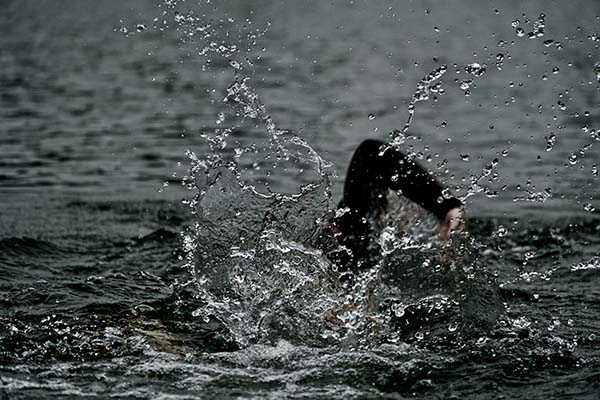Swimming has always been a part of my life. I still remember those first swimming lessons when I was just five. I was this little kid, bobbing around with floaties, terrified at first but then slowly realizing I could actually move through the water on my own. My parents thought it was essential—learning to swim isn’t just about having fun; it’s a life skill, especially for a kid. Looking back, I’m grateful because it means that now, as I’m training for a triathlon, the water feels like a second home.
But swimming isn’t just something we’ve been doing recently. It’s ancient. People have been swimming since way back, and I mean way back. So, let’s take a little dive into the history of swimming, from survival to sport and everything in between.

Prehistoric Times: Swimming for Survival
Imagine this: it’s thousands of years ago. There are no cities, no cars, no buildings—just nature, wild and raw. Early humans didn’t have much in the way of weapons or tools, so they had to rely on what they did have: their bodies. And swimming? It was essential. Back then, if you wanted food from across a river, you’d swim. If you needed to cross water to escape a predator, you’d swim.
Ancient cave paintings show people swimming over 10,000 years ago! Isn’t that mind-blowing? To think that people have been doing this exact thing—moving through water—for so long. Knowing that makes every stroke feel almost like a connection to our earliest ancestors. They swam to survive; we swim for fitness or fun, but in a way, we’re doing the same thing they did.
Ancient Civilizations: Swimming Becomes a Skill
Fast forward to ancient Egypt and Greece, and swimming starts to get formal recognition. In ancient Greece, it wasn’t just for survival anymore; it was a respected skill. They believed a well-rounded person could read, write, and, yes, swim. Swimming was seen as a sign of strength and discipline. Meanwhile, the Romans built these huge public baths where people would gather to bathe and swim, not just for cleanliness but also for relaxation and socializing. It was like their version of a community pool.
It’s fascinating to think that they valued swimming as part of a person’s overall health. There’s a record of an ancient Greek soldier, Pheidippides, who supposedly ran over 20 miles to bring news of a victory at Marathon, which we know as the origin of the marathon. But there were also stories of warriors swimming to show endurance. Imagine swimming being part of your training as a soldier!
The Middle Ages: Swimming on the Backburner
In the Middle Ages, swimming took a bit of a dive, and not in a good way. For a long time, Europeans thought swimming could lead to illness or disease. It’s strange to imagine, but water was often seen as “dangerous.” People stopped swimming as frequently, and the practice nearly disappeared in some parts of the world.
Luckily, the Renaissance came along, and people rediscovered the human body and everything it could do. Suddenly, swimming made a comeback, and by the 1500s, there were even swimming manuals teaching techniques. I guess you could say swimming had its own mini-renaissance!

Modern Swimming: From Pastime to Sport
Jump to the 19th century in England, and swimming takes off as a sport. People are forming clubs, organizing competitions, and even racing each other. The first organized swimming competitions began here, and from there, it spread. Soon, swimming became an Olympic event, starting with the first modern Olympics in 1896.
Every time I’m training in the pool, it blows my mind that I’m doing something people have been competing in for over a century. It’s not just splashing around—there’s this whole history of athletes pushing themselves, swimming faster, training harder, and bringing swimming to the level it is today. The butterfly stroke, for example, only became an official stroke in the 1950s! Now, we take it for granted as part of any competitive event.
Learning to Swim as a Kid: Why It Matters
When I think back to those early swimming lessons, I’m so glad my parents signed me up. I didn’t realize it back then, but learning to swim as a kid gives you confidence around water. Kids who can swim are safer—they know how to handle themselves and avoid accidents like drowning.
I never thought those lessons would lead me to where I am now, training for a triathlon. Knowing how to swim is a huge comfort, especially since swimming is the first leg of the race. I’ll never forget those first laps, dog-paddling and struggling to get from one end of the pool to the other. And now, here I am, swimming hundreds of meters in one go. It’s crazy to think about how far I’ve come.
Swimming Today: For Everyone, Everywhere
Today, swimming is for everyone. Whether you’re at the beach with friends, competing in an Olympic event, or, like me, training for a triathlon, swimming is accessible and rewarding. It’s amazing that what started as a survival skill is now a global sport and one of the best all-around workouts you can do. For me, every swim session is a blend of fitness and meditation, a time to just be present, focused on my breathing and movement.
Swimming pools, oceans, and lakes have all become places of joy, challenge, and community. Even though we have all this advanced technology to track our progress—apps, GPS watches, you name it—at its core, swimming is still just you, the water, and the will to keep moving. There’s something raw and grounding about that.

Why Swimming Will Never Go Out of Style
In a way, swimming has survived through the ages because it’s so simple and so natural. You don’t need fancy equipment; you just need water and the courage to jump in. That’s why it’s been around for thousands of years and why it’ll probably be around for thousands more. Whether you’re swimming for fitness, training for an event, or just splashing around for fun, you’re part of a timeless tradition.
So, next time you’re in the water, take a moment to think about all those who came before us, swimming for survival, for health, for competition. It’s a powerful thought that connects us across time. And for me? I’ll be thinking of those early swimming lessons, the ones that helped me feel confident in the water, knowing I’m part of a legacy stretching back to the dawn of humanity.





